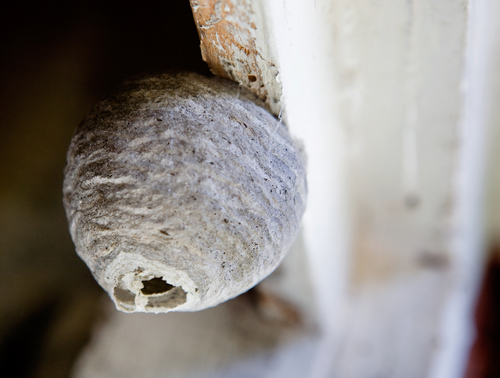Bristol Wasp Control. If you have a problem wasp or hornets nest, Call us NOW and be assured we will visit you TODAY to tackle the problem.
Wasps are often no more than a distraction, but sometimes can be become serious nuisance if nesting in your garden, roof or shed. We understand how distressing it is to be near wasps or their nest. Phobia of wasps is very real and can cause immense anxiety in people. Wasp stings can cause more than a mild reaction, and in some people, can lead to anaphalaxis which can be a life threatening situation.
What is the wasp life cycle?
A solitary Queen makes a small nest (the size of a golf ball) after emerging from winter hibernation usually in early/mid spring. This nest consists of 7 hexagonal cells in which the queen lays a single egg. The eggs in turn hatch out and become ‘worker wasps’ who’s job is to continue to build the nest around the queen who’s task now becomes solely laying more eggs and controlling the nest. All worker wasps are female. The workers continue to build the nest and care for the larvae, bringing them small insects (aphids-greenfly and whitefly) on which to feed. This high protein food allows for quick growth and a quickly expanding nest. A Queen wasp lays upto 100 eggs per day and in an especially good summer, a nest can consist of up to approximately 20,000 wasps.

As the winter approaches, the Queen wasp lays special eggs that are both male and female, when the larvae pupate, the newly hatched adults are a mix of ‘virgin queens’ and male ‘drone’ wasps. These wasps now fly away from the nest and find mating sites elsewhere. One mating is over, the newly fertilised queens find a place to hibernate over the winter and the male drones die off as do all the original workers and original queen wasp.
How wasp nests are made
Wasps strip wood, usually from fences or sheds to build their nest. The wood is mixed with saliva and becomes a paste like matter almost papier mache which is used to construct the nest. The nest is usually grey or brown but can sometimes have multiple colours depending if the wasps have been stripping fences that have been treated with coloured stain.
How to spot if you have a wasp nest
- Noting small areas of shaved wood from your fence in early spring will denote a queen wasp is using this wood to make a nest
- Seeing wasps continually using a very specific flight path to a given area
- Seeing the nest itself (usually the nest is out of sight in a soffit box or into a wall vent or cavity, unless built onto a tree branch or bush or even an exposed rafter inside a garden shed
Should I have my wasp nest treated?
If the wasp nest is causing issue or distress, it is best to have the wasp nest treated, bearing in mind that as the nest grows throughout the summer, so does its numbers and come autumn the amount of foraging wasps can cause a real issue as they are searching for sweet foodstuffs and will invade your garden or home whilst scouting. It is at this time that the wasps will become quite aggressive and being stung will become increasingly more likely.
Bristol Wasp Control
DO NOT attempt to treat a wasp nest yourselves, always call the Experts at Advance Pest Control for Bristol Wasp Control.
Have you found a wasp nest?
See what other people have said about our wasp treatments:
Call Adam at Advance Pest Control Bristol TODAY on 01172051146 for a same day treatment
Recent Posts
Summers Coming: What Does That Mean for You and Pests?
Want to know which pests to look out for this summer? Whether it is horse flies, mosquitos or rats, there are many pests out there that can cause a range of problems.
Wasp Nests: Identification and Removal
What does a Wasp Nest look like? You'll know if you've got a wasp nest nearby If you notice a large number of wasps that seem to be focused in one particular area. There are over 7000 species of wasps living in the UK, and unlike bees’ wasps are a very...
5 Ways To Keep Wasps Away From Your Property in 2022
How do you keep wasps away? Wasps and bees have many differences the main one being that bees feed their larvae pollen, and wasps feed their larvae insects. So, this actually makes wasps really good to have around your garden as they help control other insects....


